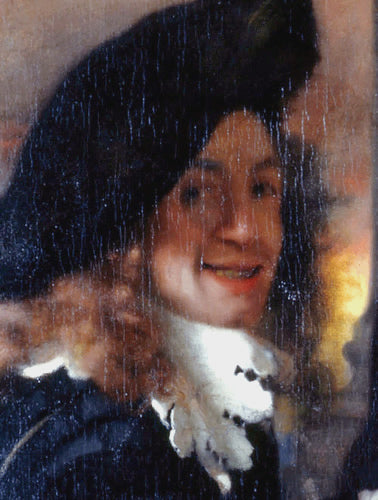Johannes Vermeer
| Full name | Johannes Vermeer |
|---|---|
| Nationality | Netherlands |
| Year of birth | 1632, Delft. |
| Year of death | 1675, Delft. |
| Style | Baroque Painting |
| Artist's image | The self-portrait shown here is the most probable image of the painter J. Vermeer, extracted from a painting by the author himself "The Procuress". Apart from this, no other image attributed to him is known. Usually, other sources incorrectly indicate a Self-portrait of Carel Fabritius. |
Dutch artist, considered one of the greatest exponents of Baroque painting of the Dutch Golden Age. The recognition of his artistic quality emerged 2 centuries after his death. During his lifetime, he endured economic hardships and never enjoyed fame in line with his works.
Works of J. Vermeer
It is known that Vermeer painted less than 50 paintings, of which only 34 have survived. Most of them are now considered masterful aesthetic models of the Baroque style.
Almost all of Vermeer's work has a genre painting orientation and is set in a couple of rooms in his own house.
Meticulous and obsessed with detail and the treatment of light. His painting was slow and deliberate. Known for using the finest pigments available at the time, including: ultramarine blue from lapis lazuli; lead-tin yellow; alizarin red and vermilion orange. Thanks to these materials, the colors in his works remain almost as vibrant as the first day. The most striking case of preservation is the vivid color of the turban in "Girl with a Pearl Earring", painted with lapis lazuli ground in oil.
-
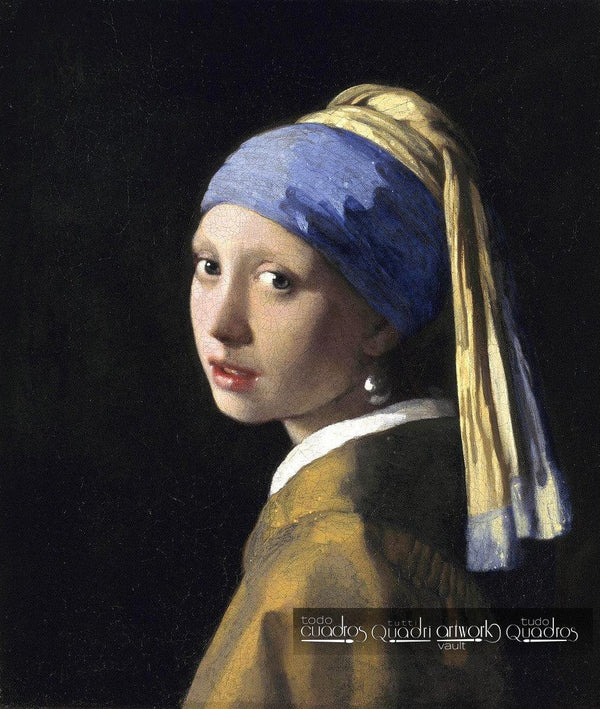
También conocido como: Muchacha con turbanteAutor: Johannes VermeerEstilo: BarrocoGénero: RetratoOriginal title: Het meisje met de parelTítulo (inglés): Girl with a Pearl EarringTipo: CuadroTécnica: ÓleoSoporte: TelaAño: c. 1665Se encuentra en: Galería Mauritshuis, La Haya.
El cuadro "La joven de la perla", también conocido como "La joven con turbante", fue pintado por Jan Vermeer (Johannes van der Meer) en 1665. La protagonista de la pintura, una joven retratada de cerca, aparece girada tres cuartos, con los labios ligeramente entreabiertos y una mirada dulce y cautivadora.
Actualmente, la obra se conserva en la Galería Real de Pinturas Mauritshuis de La Haya. -
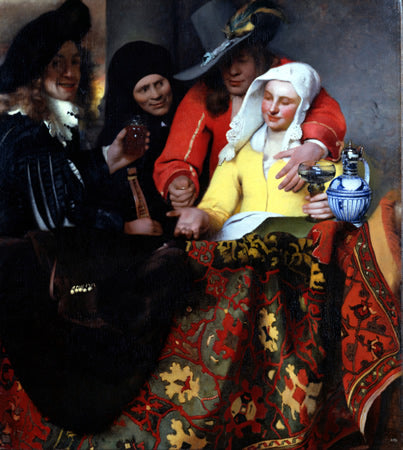
"La alcahueta"Autor: Johannes VermeerEstilo: BarrocoOriginal title: De koppelaarsterTítulo (inglés): The ProcuressGénero: CostumbrismoTipo: CuadroTécnica: ÓleoSoporte: TelaAño: 1656Se encuentra en: La "Galería de Pinturas de los Maestros Antiguos", Dresde, Alemania. -
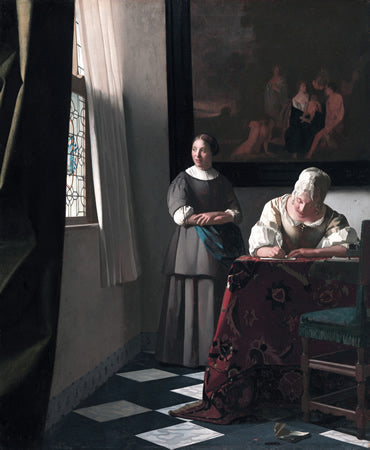
"Una dama escribe una carta con su sirvienta"Autor: Johannes VermeerEstilo: BarrocoOriginal title: Schrijvende vrouw met dienstbodeTítulo (inglés): Lady Writing a Letter with her MaidTipo: CuadroTécnica: ÓleoSoporte: TelaAño: c. 1671Se encuentra en: Galería Nacional de Irlanda, Dublín -
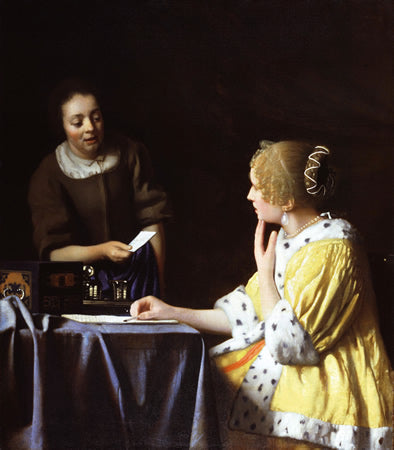
"Ama y criada"Autor: Johannes VermeerEstilo: BarrocoOriginal title: Dame en dienstbodeTítulo (inglés): Mistress and MaidTipo: CuadroTécnica: ÓleoSoporte: TelaAño: c. 1667Se encuentra en: Colección Frick, Nueva York. -
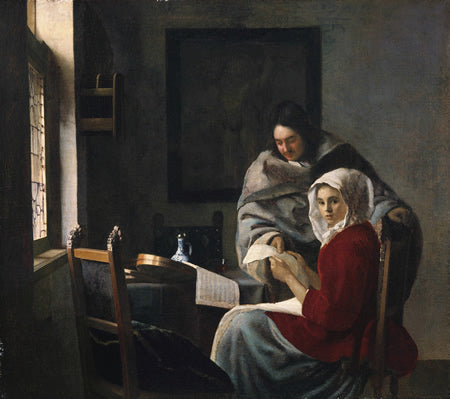
"La lección de música interrumpida"Autor: Johannes VermeerEstilo: BarrocoOriginal title: Onderbreking van de muziekTítulo (inglés): Girl Interrupted at Her MusicTipo: CuadroTécnica: ÓleoSoporte: TelaAño: c. 1661Se encuentra en: Colección Frick, Nueva York. -
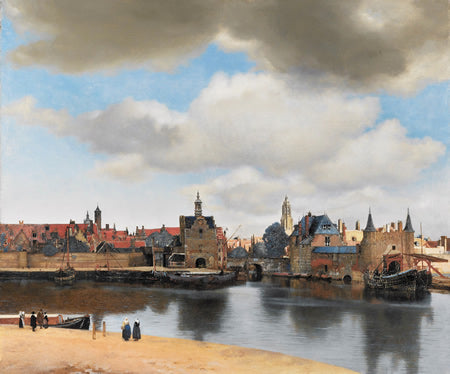
"Vista de Delft"Autor: Johannes VermeerEstilo: BarrocoOriginal title: Gezicht op DelftTítulo (inglés): View of DelftTipo: CuadroTécnica: ÓleoSoporte: TelaAño: c. 1660Se encuentra en: La Galería Real de Pinturas Mauritshuis, Países Bajos -
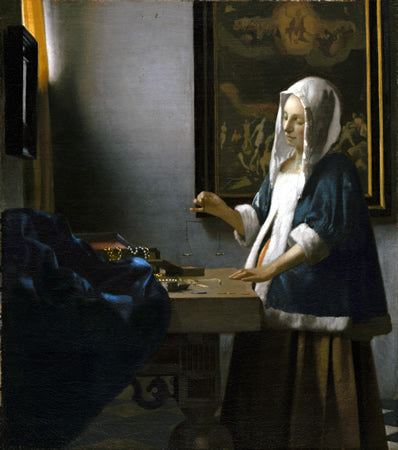
"La tasadora de perlas"Autor: Johannes VermeerEstilo: BarrocoOriginal title: Vrouw met WeegschaalTítulo (inglés): Woman Holding a BalanceTipo: CuadroTécnica: ÓleoSoporte: TelaAño: c. 1662Se encuentra en: Galería Nacional de Arte, Washington -
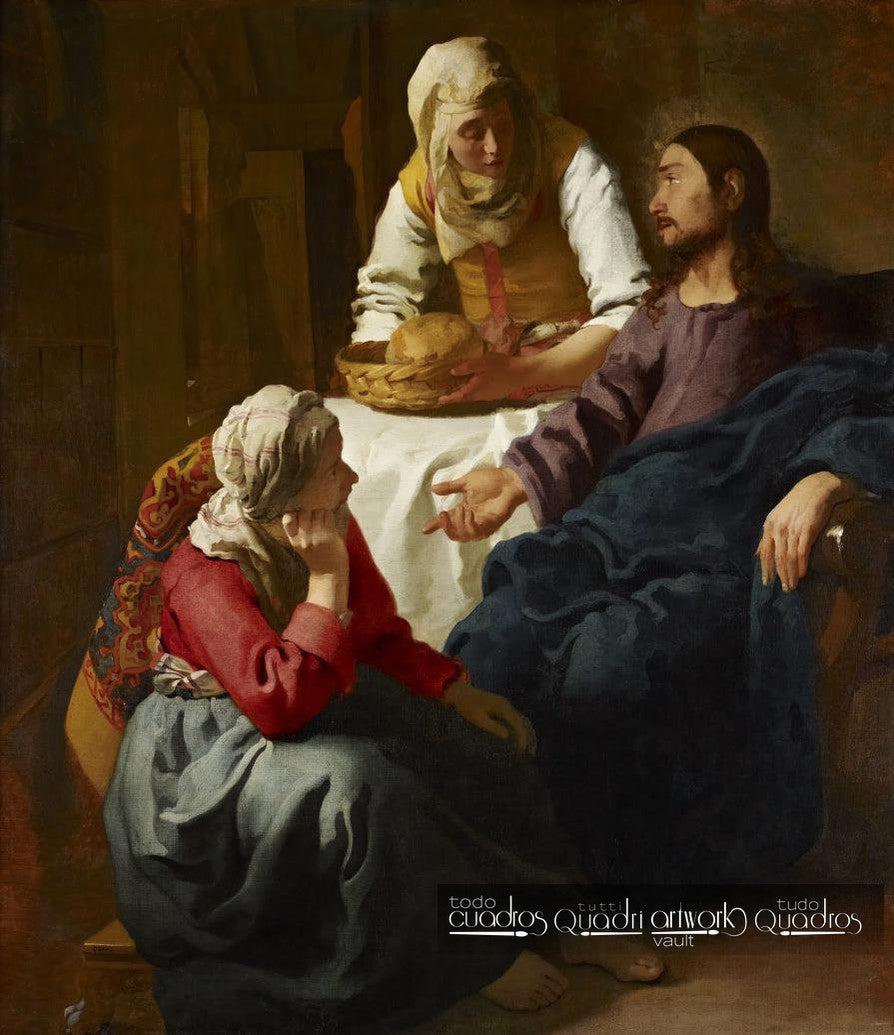
Autor: Johannes VermeerEstilo: BarrocoOriginal title: Christus in het huis van Martha en MariaTítulo (inglés): Christ in the House of Martha and MaryTipo: CuadroTécnica: ÓleoSoporte: TelaAño: 1655Se encuentra en: Galería Nacional de Escocia, Edimburgo
Cuadro Cristo en Casa de Marta y María, pintado en 1654 por Johannes Vermeer, pintor holandés de estilo Barroco. Esta obra se considera una excepción en la carrera de Vermeer, fué su única tela de inspiración religiosa. La escena bíblica plasmada es del Evangelio de San Lucas (10, 38-42), donde se relata la visita de Jesús en la casa de las hermanas Marta y María, una de ellas se queda escuchando al maestro, mientras la otra se afana por arreglar la casa. Actualmente se encuentra en la Galería Nacional de Escocia.
-
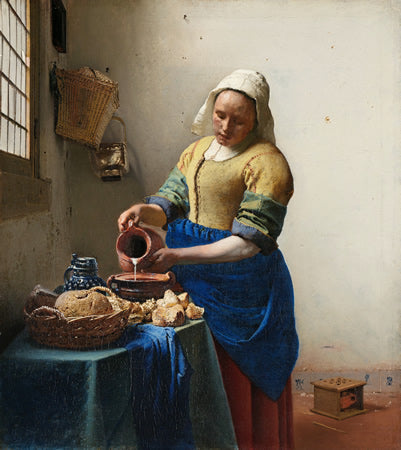
"La lechera"Autor: Johannes VermeerEstilo: BarrocoOriginal title: Het melkmeisjeTítulo (inglés): The MilkmaidTipo: CuadroTécnica: ÓleoSoporte: TelaAño: c. 1657Se encuentra en: Rijksmuseum (Museo Nacional de Ámsterdam). -
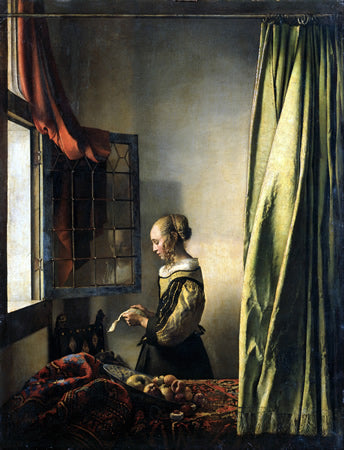
"Muchacha leyendo una carta"Autor: Johannes VermeerEstilo: BarrocoOriginal title: Brieflezend meisje bij het vensterTítulo (inglés): Girl Reading a Letter at an Open WindowTipo: CuadroTécnica: ÓleoSoporte: TelaAño: c. 1659Se encuentra en: Galería de Pinturas de los Maestros Antiguos, Dresde, Alemania. -
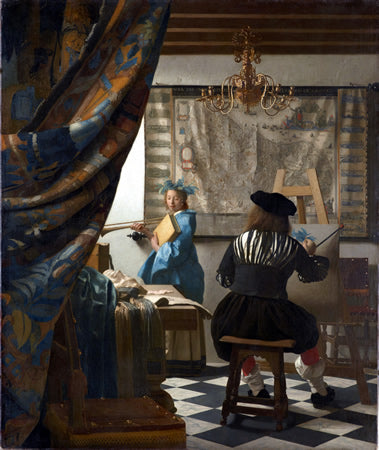
"El arte de la pintura"Autor: Johannes VermeerEstilo: BarrocoOriginal title: De SchilderkunstTítulo (inglés): The Art of PaintingTipo: CuadroTécnica: ÓleoSoporte: TelaAño: c. 1668Se encuentra en: Museo de Historia del Arte de Viena, Austria. -
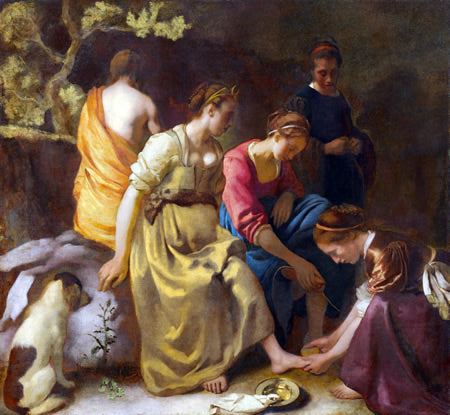
"Diana y sus compañeras"Autor: Johannes VermeerEstilo: BarrocoOriginal title: Diana en haar nimfenTítulo (inglés): Diana and Her CompanionsTipo: CuadroTécnica: ÓleoSoporte: TelaAño: c. 1655Se encuentra en: Mauritshuis, Países Bajos. -
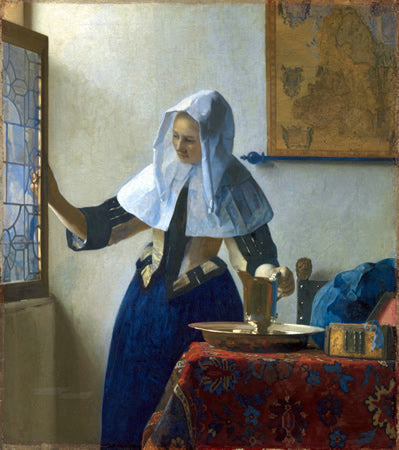
"Mujer con una jarra de agua "Autor: Johannes VermeerEstilo: BarrocoOriginal title: Vrouw met waterkanTítulo (inglés): Woman with a Water JugTipo: CuadroTécnica: ÓleoSoporte: TelaAño: c. 1662Se encuentra en: Museo MET, Nueva York. -
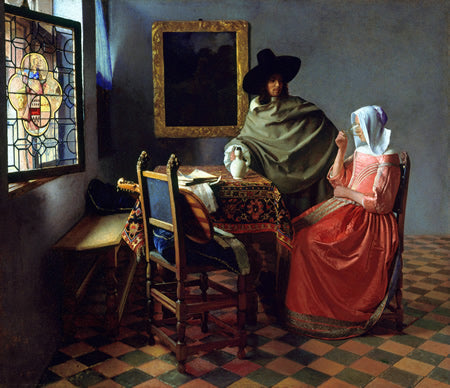
"Dama bebiendo con un caballero"Autor: Johannes VermeerEstilo: BarrocoOriginal title: Drinkende dame met een heerTítulo (inglés): The Wine GlassTipo: CuadroTécnica: ÓleoSoporte: TelaAño: 1660Se encuentra en: Pinacoteca Gemäldegalerie de Berlín, Alemania. -
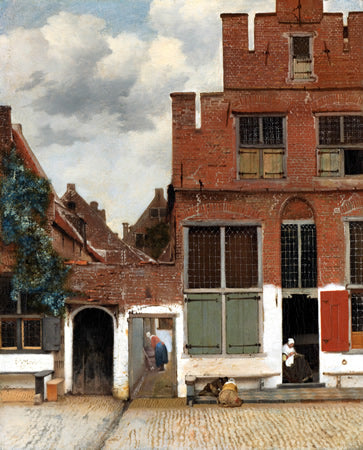
"La callejuela"Autor: Johannes VermeerEstilo: BarrocoOriginal title: Het StraatjeTítulo (inglés): The Little StreetTipo: CuadroTécnica: ÓleoSoporte: TelaAño: 1658Se encuentra en: Rijksmuseum (Museo Nacional de Ámsterdam).
Related famous painters in the shop:
↑Back to top
